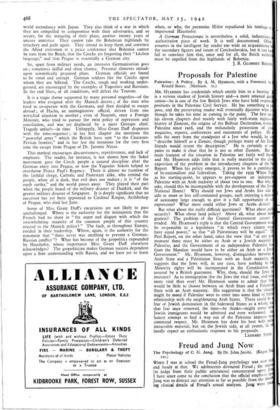Proposals for Palestine
MR. HYAMSON has credentials which entitle him to a hearing. is a serious student of Jewish history and—a more unusual qua! cation—he is one of the few British Jews who have held respell% positions in the Palestine Civil Service. He has something to p pose, and the persevering reader will eventually discover what it though he takes his time in coming to the point. The first ten his eleven chapters deal mainly with fairly well-worn topics— history of Zionism, the origins of the Balfour Declaration, events Palestine since 1918, and the melancholy procession of Cr enquiries, reports, conferences and statements of policy. He tells the story from the standpoint of a Jew who would, he sa "describe himself as a Zionist, though perhaps many of his Zio friends would resent the description." He is certainly at s pains to make it clear that he is not as other Zionists. But main features of the situation in Palestine are fairly well kno and Mr. Hyamson adds little that is really material to the da exposition of the problem in the introductory chapters of the P Report. When his policy emerges, it proves to be a combinat of bi-nationalism and federalism. Taking the 1939 White Pa as his starting-point, he appears to pre-suppose an independ Palestine with an Arab majority of about two to one. But why, asks, should this be incompatible with the development of the Jew National Home? Why should not Jews and Arabs live side side as more or less self-contained groups, each enjoying a mea of autonomy large enough to give it a full opportunity of s expression? What more could either Jews or Arabs desire?
But what about the really difficult questions? What about pu security? What about land policy? Above all, what about gration? The problem of the Central Government cannot evaded. Mr. Hyamson's reply is that the Central Government wo be responsible to a legislature " in which every citizen wo have equal power," so that " all Palestinians will be equal." Peel Report, on the other hand, takes the view that " at any gi moment there must be either an Arab or a Jewish majority Palestine, and the Government of an independent Palestine fr from the Mandate would have to be either an Arab or a Jew Government." Mr. Hyamson, however, distinguishes between Arab State and a Palestinian State with an Arab majority, suggests that the Jews will, in any case, have nothing to Minority rights will be incorporated in the Constitution, assured by a British guarantee. Why, then, should the Jews insecure? As to immigration (for the Jews the vital issue, and t more vital than ever) Mr. Hyamson seems to admit that th would be little to choose between an Arab State and a Palestin State with an Arab majority. His suggestion is that the situan might be eased if Palestine were to enter into some kind of fed
relationship with the neighbouring Arab States. There could be fear of Jewish domination in the federated States as a whole, that fear once removed, the time—he thinks—might come wh Jewish immigrants would be admitted and even welcomed. honest attempt to find a way out of the Palestine impasse m
command respect. Mr. Hyamson has done his best with ra intractable material, but on the Jewish side, at all events, he hardly expect an enthusiastic response to his proposals.
LEONARD STEM


























 Previous page
Previous page